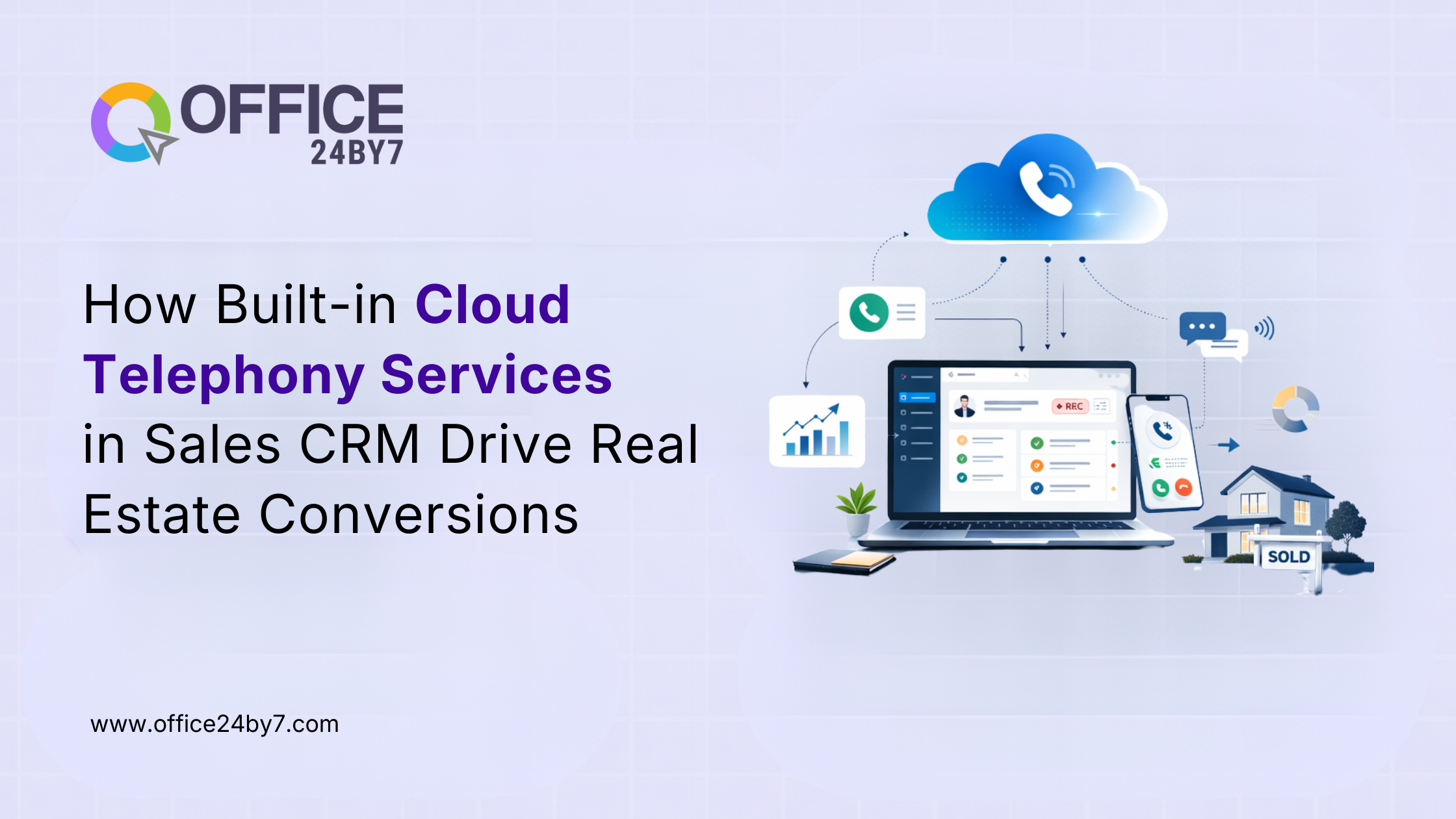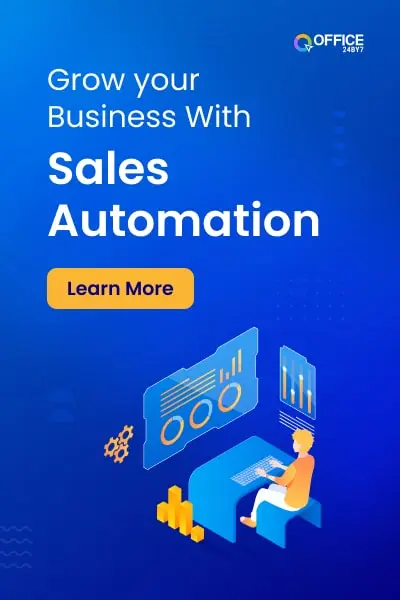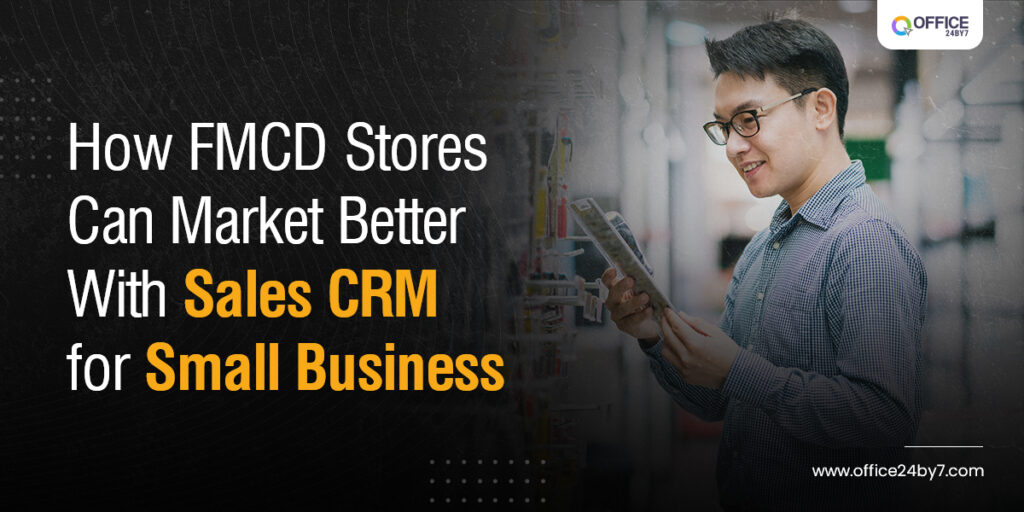
Not sure if this blog on Sales CRM for Small Business FMCD contains quality information?
Try our 1-minute short audio summary to decide. 🎧
What Is the Difference Between FMCG and FMCD?
Fast Moving Consumer Goods (FMCG)
FMCG refers to products that are sold at a quicker rate and at a relatively low cost. They are often considered essential items that are purchased frequently and consumed quickly. FMCG products have a limited shelf life, either because they perish quickly or because they are used up quickly.
Fast Moving Consumer Durables (FMCD)
FMCD refers to goods that have a longer life span and are used over a longer period. These products are not purchased as frequently as FMCG, but they play a significant role in consumers’ lives.
Here is a list of some most sought-after FMCD products: Consumer Electronics, Lighting Solutions, Power Tools and Equipment, Health and Wellness Devices, Cookware and Kitchen Utensils, Storage Solutions, Beauty and Grooming Products, Stationery, automotive accessories, Luggage and Travel Accessories, Sports Equipment, Baby and Childcare.
FMCD products are designed for longevity, typically lasting several years. This extended lifespan translates to a more substantial investment for consumers. Due to their durability, these products don’t require frequent replacement, distinguishing them from their FMCG counterparts.
The higher quality, longer life span, and high prices of the FMCD goods make it a set of purchases that the customers wouldn’t make now and then. This is why every lead must be converted into a sales by the store. If there is any hiccup or delay in converting the sale would easily go to another store.
This scarcity compared to other markets is also the reason that FMCD stores have to constantly seek innovative strategies and offers to boost sales and enhance customer satisfaction.
A sales CRM for small business is a powerful yet often overlooked asset when it comes to leveraging the customer data that can be crucial for making a business.
In this blog let’s explore a fictional case study on how FMCD stores can leverage this software to get better sales numbers.
Customer Journey A
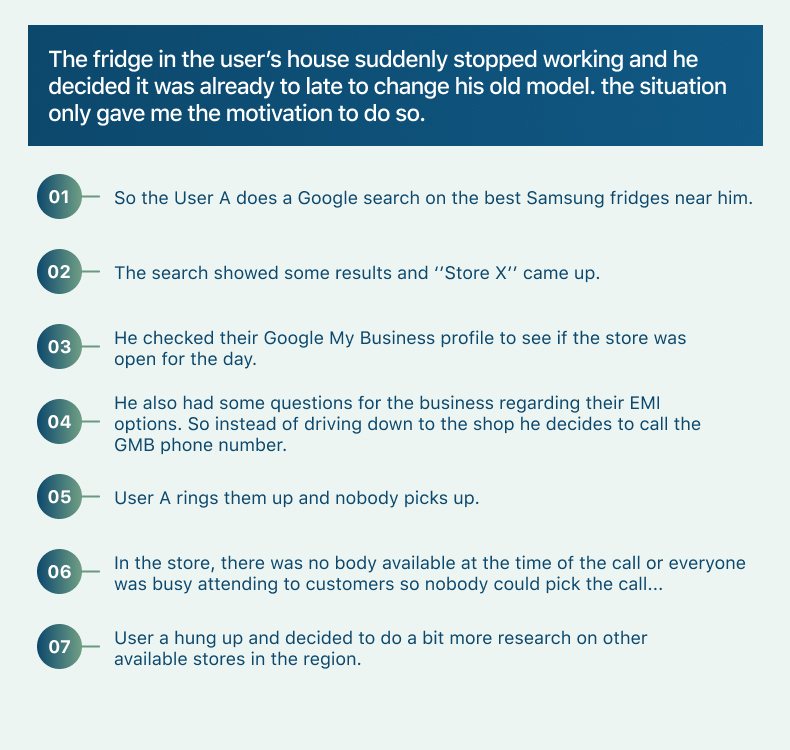
A Marketing Automation Tool
makes all the difference!

Let us now look at the customer journey of User B:
Customer B Journey
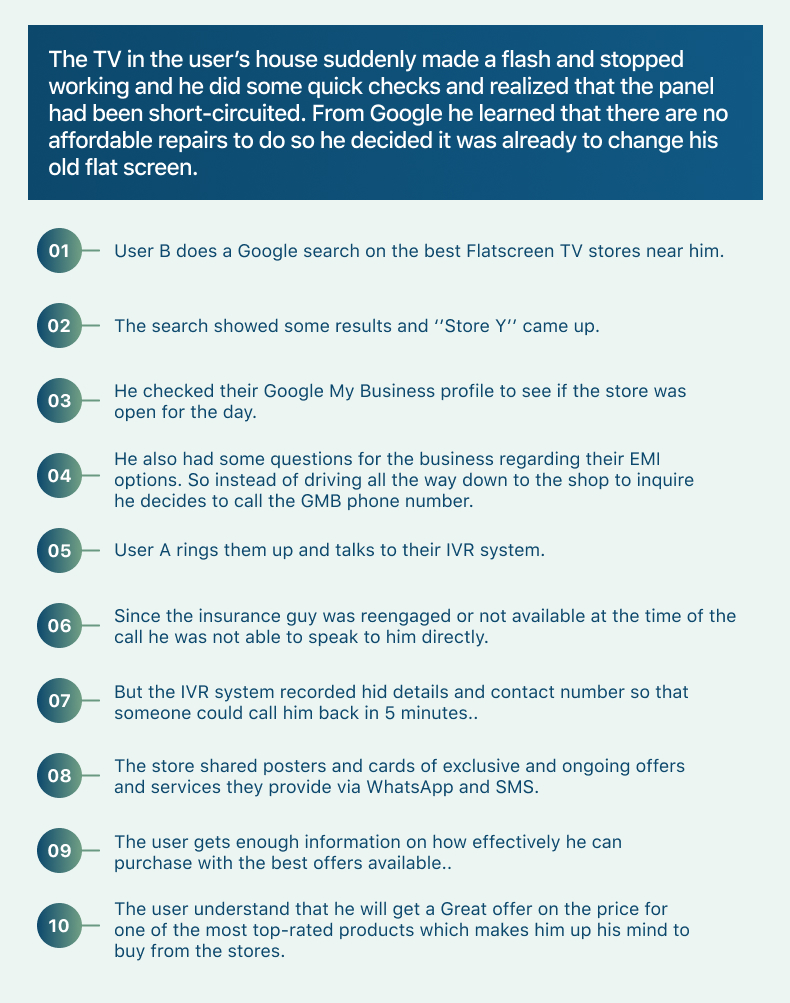
What Is Happening Here?
Both Store X and Store Y have the potential to attract numerous customers. However, only Store Y capitalized on this opportunity. Store X was unprepared, leading to significant losses in customer engagement and sales.
Store Y ensures they can reconnect with every potential customer who calls. Their IVR system is connected to a sales CRM for small business which acts as a centralized database that records incoming phone numbers. In contrast, Store X’s response to inbound calls is inconsistent and depends on the availability of its sales agents
To put this in perspective, let’s consider the potential sales impact. Suppose a flatscreen TV and a refrigerator both cost $1,000. On average, each store receives 20 customer calls per month.
With its efficient setup, Store Y can convert these calls into $20,000 worth of sales. Store X, however, struggles to match this due to their lack of preparedness and inconsistent call handling.
Store Y’s advantage lies in its systematic approach to customer engagement. By recording and following up on every call, they maximize their sales opportunities using a sales CRM for small business. Store X, on the other hand, misses out on potential sales due to their unreliable response system.
Store Y’s strategic use of technology and organized approach significantly boosts its sales. Store X’s unpreparedness results in missed opportunities and lower sales figures.
How Is This Possible?
Store Y can achieve its success by leveraging a specific type of data known as first-party data. This data is collected directly from customers’ interactions and communications with the brand. In our earlier example, the IVR system gathers details from customers considering a purchase and stores it in the sales CRM for small business used by them.
First-party data is exceptionally valuable because it provides direct access to information about customers ready to buy. Unlike other data types, where customer details might be inaccurate or buying intent weak, first-party data is precise and highly reliable.
This data includes previous purchase history, email conversations, customer service interactions, and past sales interactions. These insights help Store Y understand its customers’ preferences and behavior.
Using first-party data from sales CRM for small business, Store Y can tailor its sales strategies to meet individual customer needs. This personalized approach enhances customer satisfaction and increases the likelihood of sales conversions.
In contrast, relying on other data types might lead to missed opportunities due to inaccurate information or weak buying intent. First-party data, however, ensures that Store Y targets customers who are genuinely interested and ready to make a purchase.
First-party data is the cornerstone of Store Y’s successful sales strategy. By utilizing this clean, accurate information, they can effectively engage with customers and drive higher sales.
How Can Your FMCD Business Leverage First-Party Data?
Going back to our parallel universe, the management realizes they need to harness their existing customer data more effectively but are unsure where to start. But how can Store X turn their tables to get better sales?
Step 1: Implement a Virtual Number for Better Customer Tracking
A virtual number is a cloud-based communication system product that allows businesses to communicate internationally without the drawbacks of traditional phone systems. These numbers don’t have a direct physical line but offer features like automatic call distribution and call routing, similar to older phone systems.
For FMCD businesses, virtual numbers provide several benefits. One key advantage is call tracking, allowing stores to assign different numbers to various marketing campaigns with the help of a sales CRM for small business. This helps identify the source of incoming leads, such as a toll-free number for website click-to-call buttons and a mobile-like virtual number for WhatsApp click-to-chat buttons.
By distinguishing the source of incoming calls, businesses can better understand customer behavior. For example, they can see whether calls originate from website visitors or WhatsApp chats. This insight helps tailor marketing strategies and improve customer targeting.
Virtual numbers also enable efficient call routing based on specific requirements and incoming call traffic. This ensures that customers are directed to the appropriate staff who can address their queries effectively, enhancing customer satisfaction.
Additionally, efficient call routing reduces call waiting times, leading to a smoother customer experience. When customers are promptly connected to the right staff, their issues are resolved quickly, fostering positive interactions.
Virtual numbers offer FMCD businesses advanced communication features, effective call tracking, and efficient call routing. These benefits lead to better customer service, increased satisfaction, and improved overall business performance.
Step 2: Utilize IVR Services for Efficient Call Management
IVR services are another system FMCD businesses can set up to ensure customers are not left without proper action from the business end. An IVR service provides multiple levels of actions that customers can undergo for effective query resolution.
Customers can navigate through the IVR menu on their own without waiting for a staff member to pick up their call or resolve the query manually. This self-service approach is beneficial for both customers and businesses. It allows customers to quickly find answers while reducing the workload on agents.
IVR systems also provide automatic call routing to the right agents and departments based on customer inputs. This reduces call waiting times and call abandonment rates, ensuring customers receive timely assistance.
From a business perspective, IVR systems are highly advantageous. Agents do not need to attend to all incoming calls, allowing them to focus on more complex queries that require human intervention. This improves overall efficiency and productivity.
Additionally, IVR systems can collect valuable customer data, such as their choice of products or service issues, and store it in designated locations on the centralized sales CRM for small business. This data helps businesses understand customer preferences and tailor their services accordingly.
IVR services offer FMCD businesses an efficient way to handle customer queries, reduce waiting times, and collect important customer data. This leads to better customer satisfaction and streamlined business operations.
Deploy your own Virtual Receptionist!

Step 3: Adopt Cloud Telephony for Seamless Communication
Cloud telephony helps businesses enhance their communication systems. Imagine talking to a customer with poor call clarity or frequent call dropouts; it creates a negative impression. Cloud telephony eliminates these issues with clear, reliable communication lines.
Using cloud telephony, you can set up a small call center with the capabilities of a large company. This allows you to handle customer calls efficiently, offering a professional service regardless of your business size. Cloud communications are easy to implement and integrate with existing call center operations.
One of the key advantages of cloud telephony is its scalability. You can easily adjust the system based on demand without significant budget allocations. This flexibility ensures that your communication system can grow with your business needs.
Cloud telephony systems can seamlessly integrate with your internal sales CRM for small business. If you don’t have a sales CRM for small business, you can purchase an affordable, robust tool that works in unison with your communication channels. This integration streamlines operations, eliminating the need to switch between applications for effective communication.
Cloud telephony offers businesses enhanced call quality, scalability, and seamless CRM integration. These features lead to improved customer service and more efficient business operations.
Step 4: Leverage CRM Software for Data-Driven Insights
A sales CRM for small business is software that is often considered the backbone of any data-driven sales strategy. For small businesses, a sales CRM provides a centralized platform where all departments can collect, use, and store user data. This centralization helps monitor and control all customer interactions efficiently.
Having a CRM allows businesses to rely on accurate customer data. This data can be used to tailor sales pitches, design effective marketing campaigns, and deliver exceptional customer support. With all information in one place, businesses can better understand and meet customer needs.
A sales CRM for small business helps streamline data management, making it easier for teams to collaborate. By accessing the same data, departments can work together more effectively, ensuring a unified approach to customer engagement.
The centralized data management offered by a CRM also enhances decision-making. Businesses can analyze customer interactions and feedback to refine their strategies and improve overall performance.
A sales CRM for small businesses is a crucial tool for aiming for a data-driven approach. It centralizes data, enhances collaboration, and improves customer interaction management. This leads to more effective sales strategies and superior customer support.
Step 5: Integrate With Third-Party Tools for Enhanced Functionality
Acquiring a sales CRM for small business that easily integrates with third-party applications can significantly enhance your sales capabilities. This integration extends the functionality of your CRM, making it a powerful tool for managing various aspects of your business.
For instance, integrating your sales CRM with platforms like Justdial or Meta allows you to track customer interactions seamlessly within the CRM system. This means you no longer have to rely on multiple dashboards to handle different types of data.
By consolidating customer data from various sources into a single platform, you streamline your operations. This centralization simplifies data management and improves the efficiency of your sales processes.
Additionally, having all customer interactions in one place provides a clearer overview of your sales activities. This comprehensive view helps you make informed decisions and tailor your strategies to better meet customer needs.
A sales CRM for small business with third-party integration capabilities boosts your business’s efficiency and effectiveness. It consolidates data, streamlines operations, and provides valuable insights, leading to improved sales performance and customer satisfaction.
Why Choose office24by7 Sales CRM for Small Business?
A good sales CRM can help your FMCD store grow faster. Office24by7 is a company that develops CRM software for businesses of all industries and sizes. We’ve been helping businesses of all sizes for many years, from small startups to big companies.
There are several reasons why customers choose Office24by7 as a sales CRM for small business needs.
Affordability
Sales CRMs for small businesses come at different prices. You can choose one that fits your budget and needs. Some top companies, like Office24by7, offer affordable CRM solutions for small businesses. These CRMs are designed to boost your efficiency without costing too much. You can sort them into groups based on what you need and can afford.
Best Features
Even if you’re on a tight budget, you can still get great features in your CRM. Office24by7 offers many of the same tools that big companies use, but at prices small businesses can manage. This means you don’t have to sacrifice quality or functionality just because you’re working with a smaller budget.
Excellent Customer Support
Office24by7 takes pride in its customer support. They help you throughout your entire journey with their product. This includes giving you demos, helping you set up the CRM, and teaching you how to use it. They make sure you’re comfortable and getting the most out of what you bought. If you have any problems, their customer service team works to solve them quickly.
Ease of Use
Office24by7’s CRM is designed to be easy for small businesses to use. It’s intuitive, which means you can figure it out quickly without needing to be a tech expert. You can easily find your way around the software. The time it takes to become good at using it is short, so you can start benefiting from it quickly.
Scalability
As your business grows, Office24by7’s CRM can grow with you. It works well whether you have one user or a hundred. This means you don’t need to switch to a new system as your business gets bigger. The CRM can easily adjust to meet your changing needs, ensuring you always have the right level of support and features.
Integration Capabilities
Office24by7’s CRM works well with many other tools you might use in your business. You can connect it to things like Facebook, Google services, and your marketing tools. It also works with communication tools you might already use. This helps you manage all parts of your business from one place, making your work easier and more efficient.
Feel the power of a CRM Software!

Conclusion
Leveraging first-party data is no longer optional in today’s competitive FMCD market; it’s a necessity. By implementing tools like virtual numbers, IVR services, cloud telephony, CRM software, and third-party integrations, FMCD stores can unlock unprecedented growth and customer satisfaction. Follow TechWave’s example and start your journey towards a data-driven future today.
By following the steps outlined in this blog, FMCD stores can turn their overlooked first-party data into a powerful asset for driving sales and enhancing customer loyalty. The right tools and strategies can make all the difference, and our sales CRM for small businesses is here to help you every step of the way.
Are you ready to unlock the potential of your first-party data and transform your sales processes? Contact us today at +917097171717 or fill out the “Get a Demo” form on the right to connect with our experts and learn more about how our sales CRM for small businesses can revolutionize your operations.


